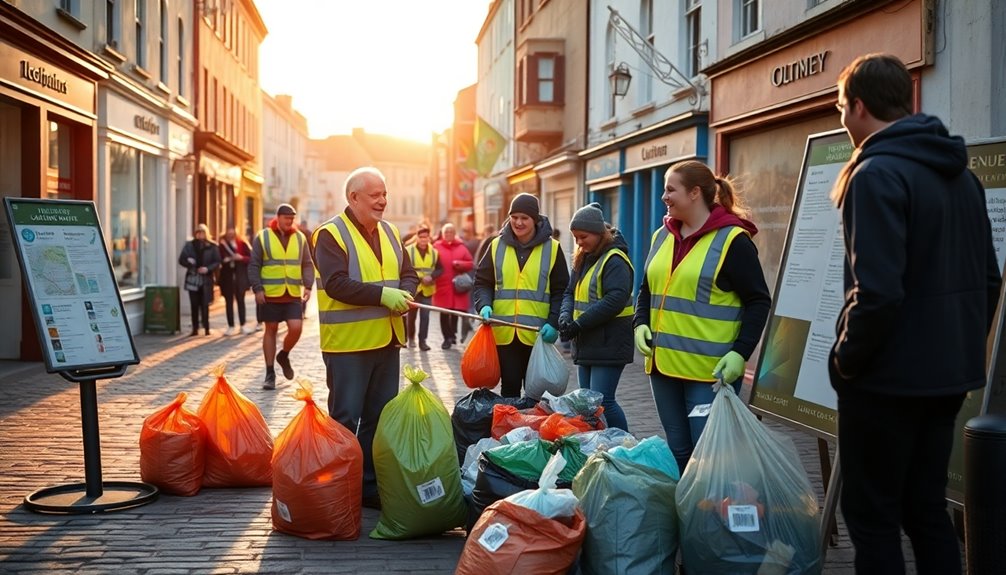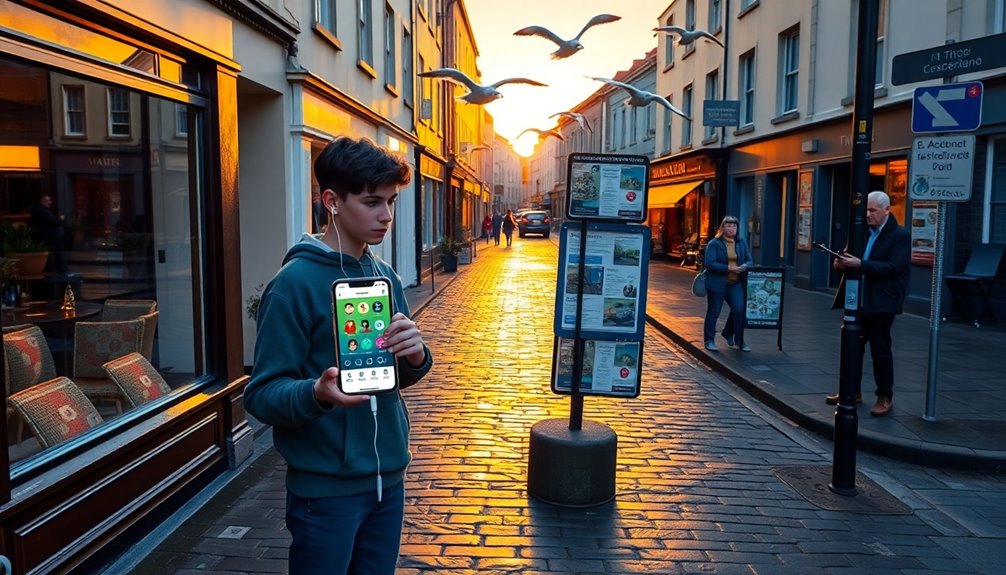
In Galway you can boost your English fast by using cafés and pubs to chat, joining conversation meetups, and volunteering for local projects. Listen at festivals and gigs to pick up slang and pronunciation, then practice in libraries, parks, or community centers. Use apps for daily drills and record yourself to track progress. Try pub quizzes and work chats to build confidence. Keep exploring these simple techniques and you’ll find practical, fun ways to improve even more.
Highlights
- Practice casually in cafés and pubs by ordering, commenting on music, and joining conversations to build natural spoken English.
- Attend local language exchanges and conversation meetups for structured practice, feedback, and role-play opportunities.
- Use Galway festivals, shows, and workshops to learn themed vocabulary and hear authentic pronunciation.
- Volunteer or work locally to practice task-based language, ask for feedback, and learn workplace etiquette.
- Leverage libraries, community centers, and apps for study spaces, meetups, recorded listening, and daily practice.
Quick Ways to Practice English in Cafés and Pubs
If you want fast, natural English practice, cafés and pubs are ideal — they’re low-pressure places where you can overhear conversations, join a chat, or ask for recommendations. You’ll slip into café conversations by ordering, commenting on music, or asking about local specialties; people love sharing tips, and you can practice slang, pronunciation, and quick replies. At pubs, listen for friendly banter and jump in when you catch a topic you like. Try pub quizzes to test vocabulary and teamwork — they’re playful chances to speak up without pressure. Move between tables, be curious, and choose venues that feel freeing. You’ll build confidence fast by listening more, replying simply, and enjoying the social rhythm.
Join Local Conversation Meetups and Language Exchanges
When you join local conversation meetups and language exchanges, you’ll get structured chances to speak, listen, and get feedback from people who’re there to help. You’ll meet language partners enthusiastic to swap skills, try casual role-plays, and build confidence without pressure. These gatherings respect your wish for freedom — you can choose topics, pace, and partners. Expect practical corrections, friendly nudges to speak more, and spontaneous cultural exchanges that broaden understanding while you practice. Treat each session as low-stakes training: show up curious, share your goals, and offer the same support in return.
Join local language meetups for low‑stakes practice: swap skills, try role‑plays, get friendly corrections, and build confidence.
- Find groups by interest to stay motivated
- Rotate partners to vary accents and styles
- Ask for focused feedback
- Bring short prompts or stories
- Track progress weekly
Use Galway’s Cultural Events to Build Vocabulary Fast
When you go to Galway’s festivals, create festival-themed word banks to capture new terms tied to events and performances. Listen closely during live shows to pick up pronunciation and colloquial phrases you won’t find in textbooks. Join workshops and post-show chats so you can practice those words in real conversation.
Festival-Themed Word Banks
Because festivals pack Galway’s streets with music, stories, and color, you can build targeted vocabulary by focusing on event-themed word banks — think “music” (set, encore, setlist), “theatre” (audience, monologue, stagecraft), and “street performance” (busker, crowdwork, tip jar). You’ll collect festival vocabulary and cultural expressions that match real moments, so learning feels free and practical. Create lists tied to roles, actions, props, emotions, and logistics, then practice with short sentences or prompts you choose. Use flashcards, sticky notes on objects, or a pocket notebook while you wander.
- Roles: performer, director, technician, volunteer, attendee
- Actions: rehearse, improvise, cue, applaud, mingle
- Props: marquee, program, rigging, props, microphone
- Emotions: exhilaration, anticipation, nostalgia, awe, relief
- Logistics: schedule, ticketing, concession, lineup, teardown
Live Performance Listening
Sound can teach you as fast as a phrasebook: attend a play, gig, or street set in Galway and focus on catching key words, repeated phrases, and performance cues to expand vocabulary in context. You’ll let live music wash over you, noting slang, emotion words, and rhythms that carry meaning beyond literal lines. At storytelling nights, listen for narrative markers — shifts, punchlines, local references — and jot them down after the show. Don’t worry about understanding every word; pick up patterns, idioms, and gestures that clarify intent. Move between venues, build a personal lexicon from performances, and practice recalling phrases aloud. This approach keeps learning active, social, and liberating, so language feels like discovery, not duty.
Workshop Conversation Practice
If you want to build vocabulary fast, join workshops tied to Galway’s cultural events where conversations are focused, purposeful, and fun. You’ll choose workshop themes that match your interests—poetry nights, storytelling, or music sessions—so every phrase you learn feels useful. In small groups you’ll try practice scenarios that mirror real life: ordering at a café, debating a poem, or pitching an idea. You’ll get immediate feedback, pick up idioms, and gain confidence to roam freely through Galway’s streets and stages.
- Role-play café and market interactions
- Debate lines from local plays
- Describe artworks during gallery tours
- Share travel stories in small circles
- Practice interview phrases with peers
These workshops let you learn fast and live freely.
Short Daily Routines to Improve Listening and Pronunciation

When you spend just 10–15 minutes each day on focused listening and pronunciation drills, you’ll notice steady improvement in how you understand and speak English. You can carve out morning or evening minutes to do listening exercises and pronunciation drills that fit your free lifestyle. Choose short podcasts, repeat tricky phrases, and record yourself to compare sounds. Be consistent, stay curious, and let practice free you from hesitation.
| Activity | Time |
|---|---|
| Shadow a 2‑3 min clip | 5 min |
| Repeat and record phrases | 5 min |
| Listen for rhythm and intonation | 5 min |
Keep routines light and flexible so they enhance your confidence without locking you into rigid schedules.
Find a Conversation Partner: Where and How to Start
Short daily drills build your ear and boost confidence, but real conversation trains you to use that progress in real time — and that’s where a conversation partner comes in. You want freedom to explore topics, make mistakes, and grow. Start locally at language cafés or join online platforms to match with learners and natives. Be clear about goals, schedule short sessions, and switch roles between speaker and listener.
- Try language cafés in Galway for relaxed, face-to-face practice.
- Use online platforms to find partners across time zones.
- Set simple goals: 20 minutes on news, 10 on storytelling.
- Swap feedback: correct gently and celebrate attempts.
- Rotate partners to avoid comfort traps and expand vocabulary.
Keep it flexible, consistent, and fun.
Practical Tips for Learning English With Galway Workplaces
You can use on-the-job tasks to practice English by asking for quick explanations, repeating instructions, and volunteering for phone or customer interactions. Pay attention to workplace norms, humour, and phrasing to pick up natural expressions and polite forms. Over time, participating in meetings and social breaks will boost both your language and cultural understanding.
On-The-Job Conversation Practice
Although the workplace can feel intimidating at first, using your job as a conversation classroom is one of the fastest ways to improve your English in Galway. You’ll build confidence for job interviews and decode workplace jargon by practicing daily, asking for clarifications, and shadowing colleagues. Keep it practical and freedom-focused: choose phrases that let you act independently and express ideas clearly.
- Ask for a quick debrief after shifts to repeat new terms.
- Use short role-plays for customer interactions or handovers.
- Keep a pocket notebook of useful phrases and idioms.
- Request feedback on pronunciation and clarity, not perfection.
- Volunteer for tasks that force you to speak, like welcoming visitors.
Stay curious, stay bold, and let work push your English forward.
Workplace Cultural Immersion
When you step into a Galway workplace, immerse yourself in both the language and the local work culture — observe meeting rhythms, casual phrases, and the unspoken rules that shape daily interactions. You’ll pick up office etiquette by watching how people greet each other, break for coffee, and handle deadlines — mimic polite tones and timing without losing your own style. Join informal chats and volunteer for small tasks to learn practical vocabulary and build confidence. Notice team dynamics: who speaks first, how feedback’s given, and when humour’s welcome. Respect boundaries but be open; authenticity wins. Use each day as a low-pressure lab to practice phrases, ask quick questions, and adapt your communication while keeping your independence intact.
Immersive Study Spots: Libraries, Parks, and Community Centers
If you want quiet focus, local libraries offer more than just books — they provide free resources, study rooms, and conversation groups where you can practice English with native speakers. You can join library tours to learn layout, borrow materials, and find quiet nooks. Nearby parks invite relaxed park reads and informal chatter; bring a notebook, follow your curiosity, and strike up friendly conversations. Community centers host workshops, language cafés, and informal meetups that respect your pace and freedom.
- Explore library tours to find your ideal study corner.
- Take park reads sessions to combine fresh air and learning.
- Visit community centers for flexible schedules.
- Use study rooms for deep work.
- Join conversation groups for casual practice.
Volunteer Opportunities That Boost Speaking Confidence

You can build real confidence by helping out on local community projects, where you’ll practice giving directions, explaining tasks, and chatting with residents. Join conversation exchange meetups to get regular, low-pressure speaking practice with both locals and fellow learners. Together these opportunities give you practical, friendly settings to use English and notice steady improvement.
Community Project Volunteering
Though stepping into a community project can feel intimidating at first, volunteering is one of the fastest ways to practice spoken English in real-life situations while doing something meaningful; you’ll meet locals, explain tasks, ask questions, and give feedback—skills that build confidence far quicker than classroom drills. You’ll choose roles that match your interests and taste for freedom, turning community engagement into daily conversation practice. Practical tasks force you to use clear instructions and friendly small talk, while collaboration accelerates skill development.
- Help run a beach clean-up and chat with volunteers
- Lead a gardening shift and describe steps aloud
- Assist at a community kitchen, taking orders and coordinating
- Tutor or mentor kids in creative projects
- Support local festivals, managing stalls and directions
Conversation Exchange Meetups
When you join conversation exchange meetups, you’ll pair with locals and fellow learners for focused, low-pressure speaking practice that feels more like socializing than studying. You’ll find language buddies who want the same relaxed progress, and you can swap stories, pronunciations, and tips. These meetups often include cultural exchanges that broaden your context while you speak. You’ll gain confidence quickly, choose topics you love, and set your own pace — no rigid classroom rules. Volunteer-run sessions let you give back while learning, and they’re perfect if you value freedom and real-world conversation. Check times, bring curiosity, and let casual chats turn into stronger skills and new friendships.
| Meetup Type | Duration | Best For |
|---|---|---|
| Casual Cafe | 60 min | Beginners |
| Topic Table | 90 min | Intermediate |
| Volunteer Host | 120 min | Advanced |
Mobile Apps and Local Resources for Rapid Progress

If you want to speed up your English in Galway, combine smart mobile apps with local resources to get steady, practical practice every day. You’ll use language learning tools for focused drills and mobile resources for spontaneous practice while exploring the city. Balance self-study with real-world input: podcasts on bus rides, vocabulary apps before class, and community noticeboards for volunteer gigs. Choose tools that free your schedule so learning fits your life.
- Duolingo or Memrise for quick daily reps
- Podcast apps with local news and storytelling
- Meetup and Facebook groups for language exchange
- Library events and bulletin boards for volunteer chances
- Voice recorder apps to track speaking progress and confidence
Weekend Activities to Reinforce English Through Experience
Because weekends give you longer, low-pressure stretches of time, use them to turn classroom practice into real-world English—visit markets, join walking tours, or attend live music nights where you can listen, ask questions, and practice speaking naturally. You’ll want a flexible plan: pick one immersive tours option each weekend — a food market, historic walk, or craft fair — and set simple goals like ordering, bargaining, or interviewing a vendor. Mix in casual language adventures: pub quizzes, open-mic nights, or volunteer shifts at community events. Aim for short, meaningful interactions rather than marathon study. Keep a tiny notebook for new words, repeat phrases aloud, and reward yourself for risks. This approach keeps learning free, fun, and fully alive on your own terms.
Some Questions Answered
Can I Get a Temporary SIM Card With Affordable Data for Language Apps?
Yes — you can get a temporary sim card with affordable data for language apps; you’ll find short‑term plans and pay‑as‑you‑go temporary data options at shops or online, letting you roam freely while learning on the go.
Are There Inexpensive Homestay Options to Enhance Immersion?
Sure — yes, you can: budget-friendly homestays boost homestay benefits and cultural exchange, letting you live locally, learn language freely, share meals, swap stories, and choose flexible stays that fit your adventurous, independent travel style and learning goals.
How Do I Handle Irish Accents and Local Slang Quickly?
You’ll adapt fastest by listening daily, using accent comprehension exercises and slang resources like podcasts, local chats and phrase lists; mimic speakers, ask clarifying questions, stay curious and bold, and don’t fear making mistakes.
Is It Safe to Practice English Late at Night in Galway?
Yes — it’s generally safe to practice English late at night in Galway, but you should trust your instincts, use night safety tips, stay aware in social interactions, stick to well-lit areas, and keep friends or contacts informed.
Can I Combine English Classes With Part-Time Work Legally?
Yes — you can, but think of your student visa as a sail: it lets you catch some wind yet imposes work restrictions. You’ll balance classes and part-time work, and you’ll seize freedom responsibly within legal limits.
Summing Everything Up
You’ve got everything you need to turn Galway into your English classroom, so immerse yourself and let the city become your teacher. Mix café chats, meetups, gigs and volunteer shifts like a recipe, stirring in apps and parks for daily practice. You’ll patch up gaps, sharpen listening and grow bold in conversation — soon your English will feel as natural as breathing. Keep exploring, keep speaking, and enjoy the ride.

https://shorturl.fm/zrg3J
https://shorturl.fm/I7uPI
https://shorturl.fm/virFn
https://shorturl.fm/UWDm6